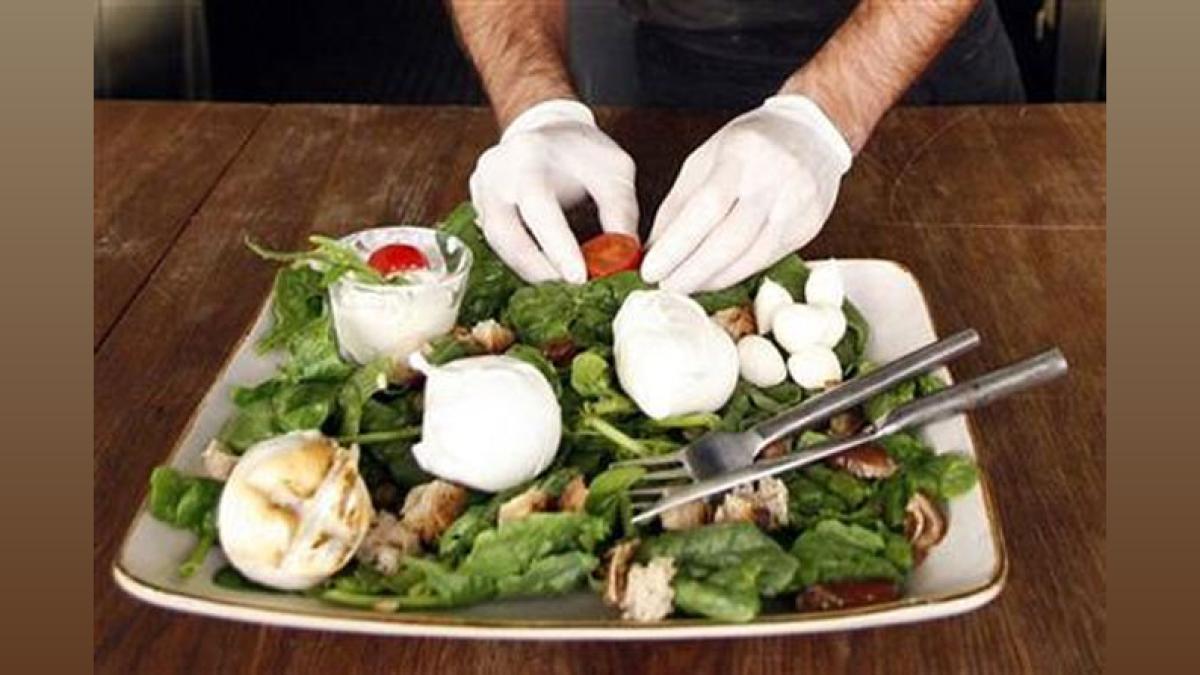FSSAI Bans Calcium Carbide for Fruit Ripening: Use Ethylene Gas Instead
The Food Safety and Standards Authority of India (FSSAI) has banned the use of calcium carbide for fruit ripening, citing health risks. It recommends using ethylene gas as a safer alternative.

New Delhi, May 18 (PTI) Food regulator FSSAI has asked traders and food business operators not to use the banned product 'calcium carbide' for ripening of fruits.
In an official statement, the Food Safety and Standards Authority of India (FSSAI) said it has "alerted traders'/fruits handlers/Food Business Operators (FBOs) operating ripening chambers to strictly ensure compliance with the prohibition on calcium carbide for artificial ripening of fruits, particularly during the mango season".
FSSAI has also advised Food Safety Departments of states/UTs to remain vigilant and take serious action and deal stringently against person(s) indulging in such unlawful practices as per the provisions of the FSS Act, 2006, and rules/regulations made thereunder.
"Calcium carbide, commonly used for ripening fruits like mangoes, releases acetylene gas, which contains harmful traces of arsenic and phosphorus.
"These substances, also known as 'Masala', can cause serious health issues such as dizziness, frequent thirst, irritation, weakness, difficulty in swallowing, vomiting and skin ulcers, etc," FSSAI said.
Additionally, acetylene gas is equally hazardous to those handling it.
"There are chances that calcium carbide may come in direct contact with fruits during application and leave residues of arsenic and phosphorus on fruits," the regulator said.
Due to these dangers, the use of calcium carbide for ripening fruits has been banned under the Regulation of the Food Safety and Standards (Prohibition and Restrictions on Sales) Regulations, 2011.
This regulation explicitly states, "No person shall sell or offer or expose for sale or have in his premises for the purpose of sale under any description, fruits which have been artificially ripened by use of acetylene gas, commonly known as carbide gas".
Considering the issue of rampant use of banned calcium carbide, FSSAI has permitted the use of ethylene gas as a safer alternative for fruit ripening in India.
Ethylene gas can be used at concentrations up to 100 ppm, depending upon the crop, variety and maturity.
Ethylene, a naturally occurring hormone in fruits, regulates the ripening process by initiating and controlling a series of chemical and biochemical activities.
The treatment of unripe fruits with ethylene gas triggers the natural ripening process until the fruit itself starts producing ethylene in substantial quantities.
Further, the Central Insecticides Board and Registration Committee (CIB & RC) have approved Ethephon 39 per cent SL for the uniform ripening of mangoes and other fruits.
In an official statement, the Food Safety and Standards Authority of India (FSSAI) said it has "alerted traders'/fruits handlers/Food Business Operators (FBOs) operating ripening chambers to strictly ensure compliance with the prohibition on calcium carbide for artificial ripening of fruits, particularly during the mango season".
FSSAI has also advised Food Safety Departments of states/UTs to remain vigilant and take serious action and deal stringently against person(s) indulging in such unlawful practices as per the provisions of the FSS Act, 2006, and rules/regulations made thereunder.
"Calcium carbide, commonly used for ripening fruits like mangoes, releases acetylene gas, which contains harmful traces of arsenic and phosphorus.
"These substances, also known as 'Masala', can cause serious health issues such as dizziness, frequent thirst, irritation, weakness, difficulty in swallowing, vomiting and skin ulcers, etc," FSSAI said.
Additionally, acetylene gas is equally hazardous to those handling it.
"There are chances that calcium carbide may come in direct contact with fruits during application and leave residues of arsenic and phosphorus on fruits," the regulator said.
Due to these dangers, the use of calcium carbide for ripening fruits has been banned under the Regulation of the Food Safety and Standards (Prohibition and Restrictions on Sales) Regulations, 2011.
This regulation explicitly states, "No person shall sell or offer or expose for sale or have in his premises for the purpose of sale under any description, fruits which have been artificially ripened by use of acetylene gas, commonly known as carbide gas".
Considering the issue of rampant use of banned calcium carbide, FSSAI has permitted the use of ethylene gas as a safer alternative for fruit ripening in India.
Ethylene gas can be used at concentrations up to 100 ppm, depending upon the crop, variety and maturity.
Ethylene, a naturally occurring hormone in fruits, regulates the ripening process by initiating and controlling a series of chemical and biochemical activities.
The treatment of unripe fruits with ethylene gas triggers the natural ripening process until the fruit itself starts producing ethylene in substantial quantities.
Further, the Central Insecticides Board and Registration Committee (CIB & RC) have approved Ethephon 39 per cent SL for the uniform ripening of mangoes and other fruits.
You May Like To Read
TODAY'S MOST TRADED COMPANIES
- Company Name
- Price
- Volume
- Vodafone-Idea-L
- 11.65 (+ 3.56)
- 106772451
- Alstone-Textiles
- 0.28 ( -3.45)
- 44187760
- Mangalam-Industrial
- 0.88 ( -2.22)
- 39177573
- Sunshine-Capital
- 0.27 (+ 3.85)
- 35956340
- GMR-Airports
- 104.40 (+ 6.37)
- 30453005





